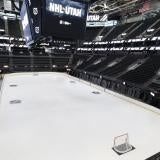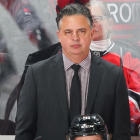 |
| NHL players have not commited to playing in the 2014 Olympics. (US Presswire) |
More NHL: Scores | Standings | Odds | Fight-O-Meter | League Leaders | Rumors
Thursday marked one year to the opening ceremonies of the 2014 Olympic Winter Games in Sochi, Russia. With the countdown clock officially ticking, it is still unclear if the National Hockey League will allow its players to participate.
In an email to CBSSports.com, NHL deputy commissioner Bill Daly confirmed that the league, along with the NHLPA, will meet with officials from the International Ice Hockey Federation and the International Olympic Committee this month.
“We hope to have a better idea of how we are going to proceed following that,” Daly said.
A spokesman for the IIHF would not comment on the specifics of the meeting but offered a little insight into when a final decision might be reached.
“IIHF President René Fasel has said several times that setting a deadline [for a final decision from the NHL] would not be productive,” said IIHF communications director Szymon Szemberg in an email to CBSSports.com. “From a practical standpoint, May would be a reasonable month for a decision, if not before.”
So there’s a chance that fans could be waiting a bit longer.
Many are wondering what the holdup is on a final decision. That’s where things get a little complicated.
In all likelihood, the NHL will allow its players to go to Sochi, but the NHL and NHLPA are said to be looking for a little more in return from the IIHF and IOC for shutting down the league for two weeks in the middle of the season.
Neither Daly nor an NHLPA spokesperson commented on the specifics, but it does not appear to be money that each party is after.
According to TSN’s Bob McKenzie, both the NHL and NHLPA appeared to be united in their aim for better access to players, including use of images, video, better accommodation and tickets.
The IOC is fiercely protective of its brand and its media. For instance, the NHL doesn’t have rights to share Olympics highlights on any of its media platforms.
From the NHL’s perspective, the league inconveniences itself to allow its players to participate yet gets very little in return. Looking for an arrangement that isn’t all that different from Olympics sponsors would not be asking a lot.
The exposure of the Vancouver Olympics certainly helped the NHL’s cause in attracting new fans but didn't really result in earth-shattering TV ratings or ticket sales for the league.
Even with a nine-hour difference between Sochi and Eastern time, NBC has committed to airing hockey live and would likely re-air bigger games on tape delay. With that difference, the chances of hitting as many eyeballs live as the games did from Vancouver are pretty slim.
The exposure potential shrinks while the logistical inconvenience grows for the NHL.
From the IOC perspective, the use of NHL players adds intrigue, improves the quality of the games and attracts the NHL’s large fan base. Interest in the Olympics is always high, but the addition of NHL players adds name recognition and has the potential to draw a broader audience.
Should the NHL not allow its players, the European nations would be able to pull from their top professional leagues while the North American countries would be most likely to use players from the American Hockey League, Canadian major junior and U.S. colleges.
There’s a chance that this wouldn’t matter to the casual Olympic viewer. But the Games become less attractive to NHL fans, which is an audience the Olympics (and NBC) wants to engage.
It would seem the IOC needs the NHL more than the NHL needs the Olympics.
It is widely known that the majority of NHL players would like to see continued participation in the Olympics. Even many of the players not asked to go as part of their national teams seem to be supportive since it means a two-week break in the middle of a typically grueling season.
What the players want is certainly going to weigh heavily into the decision for the NHL, but it doesn’t change the fact that the league has a right to seek more in return from the IOC and IIHF.
For the risk that the league incurs with the possibility of star players getting injured and the two weeks during which it isn’t generating much of any revenue, it is perfectly fair for the NHL to want a little more coming back the other way.
There’s still a strong chance this gets resolved and the NHL goes to Sochi, but these are the issues that will need to be resolved before anything can move forward.
For more hockey news, rumors and analysis, follow @EyeOnHockey and @chrismpeters on Twitter and like us on Facebook.





















